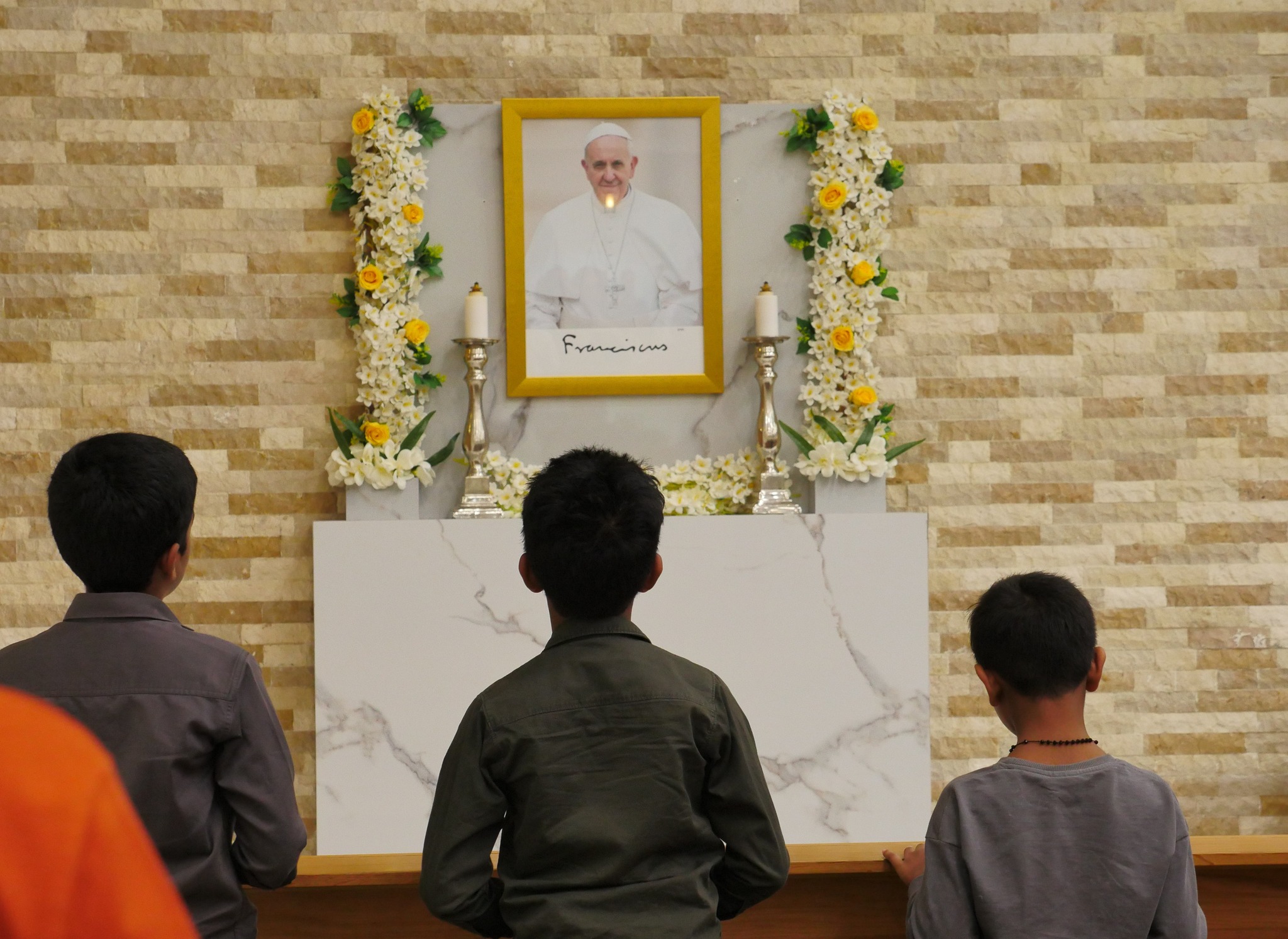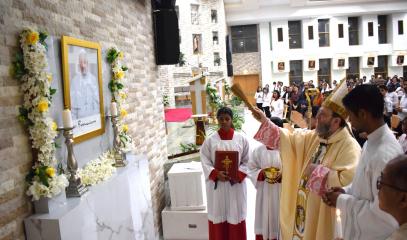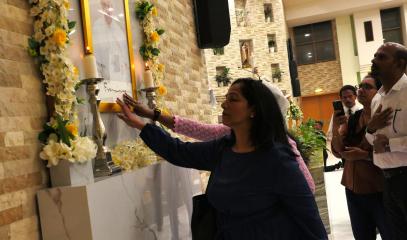Martinelli: ‘Polyphony of faith’, the legacy of Pope Francis and the Church in the Gulf
In a reflection sent to AsiaNews, the Vicar of Arabia describes the pontiff as a ‘concrete presence’ for Christians in the region. The 2019 apostolic journey, the birth of the House of Abraham and the signing of the document on fraternity. A universal fraternity that welcomes differences as a gift and a treasure, the encyclical Laudato sì and regret at the failure to participate in COP28.
Abu Dhabi (AsiaNews) - Pope Francis ‘is not an abstract entity, but a concrete presence’ for the Church in Arabia, not least because ‘he was the first pope to come to the Gulf’ for a ‘unique’ visit that ‘truly opened a door that no one could have imagined just a few years ago,’ Msgr. Paolo Martinelli, apostolic vicar of Southern Arabia (United Arab Emirates, Oman and Yemen), shares with AsiaNews, in an in-depth reflection on the value of the pontiff who passed away yesterday morning and his relationship with the Gulf and a migrant Church.
‘Everyone feels close to him,’ the prelate observed, ‘our faithful first and foremost, but also those of other religions who have shown great affection. I myself have received letters from leaders and heads of other faiths expressing their participation in the grief.’
In the Vicariate of Southern Arabia, the heart of the celebrations for the death of the Argentine pope will be the House of Abraham where a solemn Mass will be celebrated on 24 April, concelebrated by the apostolic nuncio and ambassadors, as well as the leaders of the structure.
‘We will emphasise,’ explains Msgr. Martinelli, ‘the deep bond that unites Francis with the land of Arabia in this place, the Church of St Francis, donated by the President of the United Arab Emirates to the Pope himself: a privileged place,’ he says, ‘to underline this union that has been created.’ This unity with the Pope was strengthened by his apostolic journey in 2019 and has prompted the faithful ‘to flock to churches at this time to pray.’
Msgr. Martinelli reserves a final reflection on the theme of migrants and Pope Francis' “continuous call” to “welcome them, above all to respect their profound dignity,” the prelate observes.
These are fundamental elements for a Church composed in its vast majority of migrants from ‘many parts of the world, almost a hundred different nationalities.’ And this prompted him, during the Mass at the stadium in Abu Dhabi in 2019, to use the expression ‘polyphony of faith, in a plurality of gifts, charisms, traditions and rites.’
Below is the testimony sent to AsiaNews by Msgr. Martinelli:
First of all, I believe that the strong reaction in the Church and in the world to the announcement of the end of Pope Francis' earthly mission, of sorrow for his death and gratitude for what he has accomplished in these 12 years, is already a clear expression of the enormous value of this pontificate.
In recent years, Pope Francis has made numerous prophetic gestures, held extraordinary meetings, offered a broad magisterium, and addressed the fundamental questions posed by the ‘change of era,’ as he himself repeatedly said, in which we find ourselves.
For the Apostolic Vicariate of Southern Arabia, which includes the United Arab Emirates, Oman and Yemen, his visit to Abu Dhabi (3-5 February 2019) for the signing of the document on Human Fraternity together with the Grand Imam of Al-Azhar, Ahmad al-Tayyib, will certainly remain indelible.
It was the first time a Supreme Pontiff had visited the Arabian Peninsula. Even today, the memory is still very much alive among our faithful, among people of other religions and government authorities.
This document expresses Pope Francis' vision of interreligious dialogue, which calls on people of different faiths to work together to make the world more humane and fraternal by adopting, as the text states, “the culture of dialogue as a way; common cooperation as a conduct; mutual knowledge as a method and criterion”.
It speaks of the centrality of God in human life and society; of the dignity of every person, the value of freedom, justice ‘based on mercy’ and the education of new generations in religious meaning and spiritual values; the promotion of the family and women in society. In particular, it strongly affirms that violence can never be committed in the name of God.
Religious experience, by its very nature, is an experience of peace and mercy. Violence in the name of God is a betrayal and exploitation of religion. Faith, the document tells us from the outset, urges us to consider every human person as a brother or sister, especially those in need.
In addition, Pope Francis also visited the local Church in Abu Dhabi on that occasion. He visited St Joseph's Cathedral and, above all, celebrated Holy Mass in the Zayed Stadium, which was packed with faithful. I would like to recall a passage from his homily: ‘You here know the melody of the Gospel and live the enthusiasm of its rhythm. You are a choir that includes a variety of nations, languages and rites; a diversity that the Holy Spirit loves and wants to harmonise ever more, to make it a symphony. This joyful polyphony of faith is a witness that you give to everyone and that builds up the Church.’
For me, these words represent a specific legacy for our local Church: to be a Church in which unity is experienced in the diversity of gifts, charisms, cultures, traditions and different rites.
Above all, we must not forget that the signing of the document on Human Fraternity took place during the celebration of the eighth centenary of the meeting between St. Francis of Assisi and the Sultan of Damietta, Malik al-Kāmil (1219-2019). In this perspective, the profoundly ‘Franciscan’ character of the pontificate is also confirmed, beginning with the choice of name.
This character is further deepened by magisterial documents that are also decisive for us in the Gulf. I am thinking, for example, of the Franciscan-inspired encyclical Fratelli tutti, which in fact constitutes the most systematic elaboration of the document signed in Abu Dhabi, in which social friendship is proposed as a means of promoting an inclusive and supportive society, in the proposal of a universal fraternity that welcomes differences as a gift and a treasure to be shared.
In the encyclical Laudato sì on the care of our common home, the Pope invites us to follow the example of St. Francis of Assisi, who saw in all creatures a gift from God, for which we should give praise to the Most High.
In this regard, I think of the importance of this fundamental theme also for the United Arab Emirates, where COP 28 (30 November-13 December 2023) was celebrated in Dubai, in which Pope Francis ardently wished to participate. Unfortunately, this wish did not come to fruition due to the flu.
Finally, Pope Francis remains in the hearts of the faithful of our apostolic vicariate also for his relationship with Oman and Yemen. Through his two trips to the Gulf (Abu Dhabi and Bahrain), Pope Francis has fostered relations with Oman, which has now had stable diplomatic relations with the Holy See for two years.
This is something that helps our pastoral work with Catholics living in this country. And again, we are immensely grateful to Pope Francis for never forgetting the tragedy in Yemen.
Although the country has been effectively forgotten by the world during its ten years of civil war, the Pope has never failed to make his voice heard and call for reconciliation between the parties.
I remember with emotion when, during the general audience on 19 April 2023, the Pope mentioned the names of the seven Missionaries of Charity sisters, of Mother Teresa of Calcutta, who were killed in two attacks in Yemen, in July 1998 and at the beginning of the civil war, on 4 March 2016, calling them ‘martyrs of our time’.
On Easter Sunday this year, the day before his death, in his Urbi et Orbi blessing, he spoke again about Yemen, calling once more for peace: ‘I also turn my thoughts to the people of Yemen, who are experiencing one of the worst “protracted” humanitarian crises in the world due to the war, and I invite everyone to find solutions through constructive dialogue’.
I truly believe that Pope Francis, also because of his loving and tender concern for those who suffer, will remain forever in the hearts of those who live in the Arabian Peninsula.
*Apostolic Vicar of Southern Arabia
GATEWAY TO THE EAST IS THE ASIANEWS NEWSLETTER DEDICATED TO THE MIDDLE EAST. WOULD YOU LIKE TO RECEIVE IT EVERY TUESDAY? TO SUBSCRIBE, CLICK HERE.










.png)










